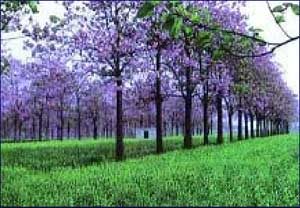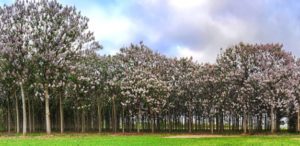Lately the paulownia tree, sometimes known as the Royal Tree, the Princess Tree, or even the Empress Tree, has been getting a lot of press. It is an extraordinary deciduous species, and is native to China.
 This species of tree grows extraordinarily quickly. It can grow as much as 50 cm per year, which means that it takes a much shorter length of time before you can harvest for timber when compared to other species of trees. As well, the canopy of the paulownia tree can reach over 10 meters very quickly, and therefore provides shade more rapidly than other species. The paulownia tree is not fussy when it comes to the best type of soil needed for optimal growth. It can even resist droughts and the effects of air pollution. It has been claimed that the paulownia tree can actually resist insect invasion, and improve the soil in the area. The paulownia tree is a multipurpose species as its lavender, pink blossoms are edible. And the wood harvested is of great value as it can be used in the manufacture of wood floorings, furniture, boxes, and music instruments.
This species of tree grows extraordinarily quickly. It can grow as much as 50 cm per year, which means that it takes a much shorter length of time before you can harvest for timber when compared to other species of trees. As well, the canopy of the paulownia tree can reach over 10 meters very quickly, and therefore provides shade more rapidly than other species. The paulownia tree is not fussy when it comes to the best type of soil needed for optimal growth. It can even resist droughts and the effects of air pollution. It has been claimed that the paulownia tree can actually resist insect invasion, and improve the soil in the area. The paulownia tree is a multipurpose species as its lavender, pink blossoms are edible. And the wood harvested is of great value as it can be used in the manufacture of wood floorings, furniture, boxes, and music instruments.
 So it would seem that this Empress of trees provides solutions to many problems. Costa Rica is committed to environmental solutions, and strategies to protect the eco-systems found in the country. Yet deforestation is still a serious problem here as forests are being cut to make room for cattle ranches, pineapple farming, and palm oil plantations. In the past 70 years, over 80% of the forests in Costa Rica have disappeared. Costa Rica is not the only country dealing with this problem as deforestation is a major problem world-wide. The world-wide loss of forests leads to soil erosion and destruction, loss of biodiversity, changes in the water tables, and major climate changes.
So it would seem that this Empress of trees provides solutions to many problems. Costa Rica is committed to environmental solutions, and strategies to protect the eco-systems found in the country. Yet deforestation is still a serious problem here as forests are being cut to make room for cattle ranches, pineapple farming, and palm oil plantations. In the past 70 years, over 80% of the forests in Costa Rica have disappeared. Costa Rica is not the only country dealing with this problem as deforestation is a major problem world-wide. The world-wide loss of forests leads to soil erosion and destruction, loss of biodiversity, changes in the water tables, and major climate changes.
Throughout the world, deforestation has become a major threat to the environment. This Princess tree could be the solution to start addressing this problem. For a number of reasons, the paulownia tree makes a lot of sense. It produces valuable timber much faster than other species, produces timber for a variety of uses, is resistant to drought and air pollution, and even improves the soil in the region. Unlike any other species, the paulownia tree could really make a difference to Costa Rica’s reforestation efforts and in record time.
